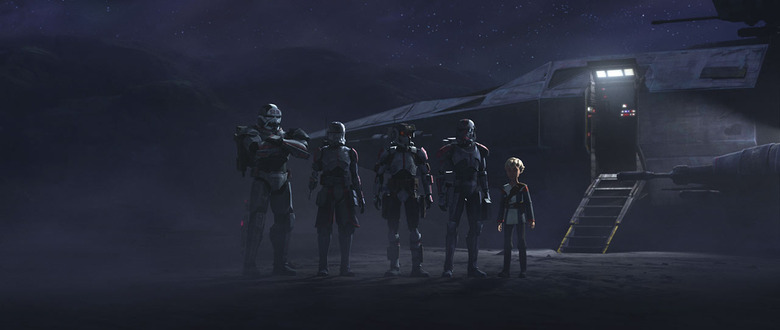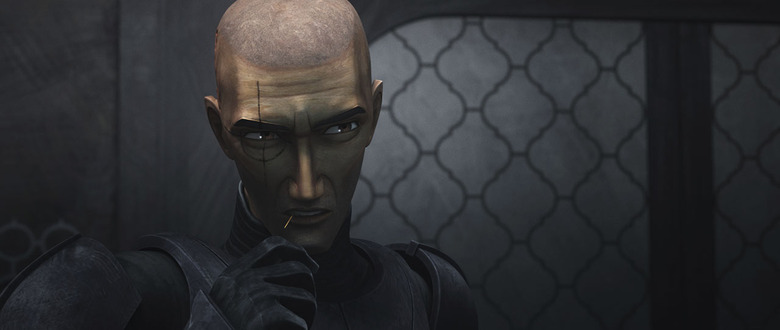'Star Wars: The Bad Batch' Makes A Promising Shift To Spotlight A 'Rebels' Origin Story In "Devil's Deal"
The Bad Batch takes a bold story departure, rendering its eponymous Batch (Dee Bradley Baker) as a cameo in their own series. They surface at the 13-minute mark then peace out, while Crosshair is present as a supporting player carrying out the Empire's bidding.
Last week, "Common Ground" opened on another person's story before passing the spotlight to the Bad Batch. The opening of "Common Ground" prepares the audience for the drastic shift in "Devil's Deal" (directed by Steward Lee and written by Tamara Becher-Wilkinson) by opening on a similar agitated civilian crowd shot but then fully committing to someone else's story, namely the story of the influential Twi'lek Syndulla family on the Twi'lek homeworld of Ryloth. It also serves to bridge events and character growths between Clone Wars and the Original Trilogy-era Rebels.
A Twi'lek crowd protests the Imperial presence on Ryloth against Twi'lek Senator Orn Free Taa (Phil Lamarr) promise of jobs and prosperity. As a revolutionary who fought the Separatists occupation, the highly respected Cham Syndulla (Robin Atkin Downes) encourages the Twi'leks to support the Empire's vision of peace. But his second-in-command Gobi (Corey Burton) is suspicious of the Imperial's mandate for the Twi'lek population to lay down their weapons. Behind Cham's back, Gobi has the Syndulla daughter, Hera (Vanessa Marshall, reprising her Rebels role with a convincing kid voice) to spy on a new Imperial refinery. She is caught and clone Captain Howzer (Baker) lets her off with a warning.
We observe adult Twi'leks leaders debating "peace" or the illusion of it as Vice Admiral Rampart (Noshir Dalal) preaches about working for the natives' best interest (yeah, right). Back in "Liberty on Ryloth" in Clone Wars, Cham voiced skepticism at the possibility of Republic occupation if they don't clear out Ryloth after the Separatist defeat. But he now believes that it's worth complying with the Republic-turned-Empire to ensure no more war. Gobi points out that the Imperials are siphoning the Twi'lek's agency in running their own planet under the guise of offering job creation, prosperity, and peace. After clocking in the gunnery at the Imperial refinery, Cham's wife Eleni (Ferelith Young) grills her husband, "If the Empire's version of peace is not one we can accept, then what?" She harbors her own league of informants to keep tabs on the Empire's actions. These familial interplays are fertile ground that could sustain more running time. (Cham and Eleni's marriage echoes the dynamic between Imanuel and Venisa Doza in the Sequel Trilogy-Era Star Wars Resistance, though short of the intriguing edge that the Dozas' marriage was implied to have been wounded by their disagreements in confronting galactic injustice.)
Nebulous, though, are young Hera's motivation for opposing the Imperials as much as Marshall's sincere performance anchors Hera with an innate spunk of a dreamer who has stared at the skies since childhood. We aren't granted personal specifics about Hera's disgruntlement with Imperials other than observing that "people don't seem happy" and her deference to Gobi. It's dodgy, she joins her uncle's supply run without knowing that the transaction involved weaponry for the cause. As a result of these underdevelopments, it negates the interesting contradiction of a girl who would fight for her planet as she pines to fly away.
The Batch in the Background
Focusing on a set of characters who appeared in Clone Wars and Rebels comes off as the series' hit-or-miss habits of ushering familiar franchise faces into the Bad Batch's story. But its creative intentions are evident. Relegating the Batchers into a short screen time in a supporting role as mercenaries mundanely performing a transaction fleshes out their role in the margins of the galactic war more effectively than in the last episode. When Hera is given downtime to chat with Omega (Michelle Ang), they display curiosity for each other's respective stories since they rarely have a window to see other modes of being, although the two girls don't have the fuller picture of the other's struggles. "I thought you were in trouble, isn't that why we're here?" Omega remarks. They part ways and go back to their respective stories.
"Devil's Deal" also subtly encourages questions about the agency of clones under the brain chip and the cognitive reach of said brain chip after the implications the obedience brain chip influenced reg clones to commit atrocities on civilians after Order 66. While serving under the Empire, Captain Howzer is the first reg clone soldier, who's not our familiar Rex, in the Bad Batch to be humanized with an unaggressive demeanor, belief in the Empire's good intentions for Ryloth, and ability to act on a (limited) ability to protect Cham Syndulla from the Empire's wrath. We don't know yet how he acted under his Order 66 command and he's not pegged as an outward aggressor, although his complicity in the Imperial oppression of the Twi'lek people and attempts to bridge the discord between the Syndullas and the Imperials bear the promises of nuances.
So far, the Empire gets what they want. Rampart arranges for Crosshair to assassinate Orn Free Taa and frame the Syndullas. Concluding on a cliffhanger with Hera sent away from the arrest of her parents with Howzer on her trail, "Devil's Deal" is an obvious first part of an arc. Despite its shortcomings, it conducts an engaging watch and plants the seeds of conflict in fertile ground.
Other Thoughts:


